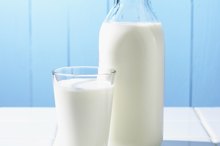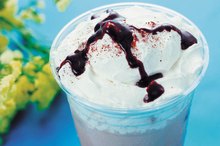What does fact checked mean?
At Healthfully, we strive to deliver objective content that is accurate and up-to-date. Our team periodically reviews articles in order to ensure content quality. The sources cited below consist of evidence from peer-reviewed journals, prominent medical organizations, academic associations, and government data.
- Academy of Nutrition and Dietetics: Staying Away From Fad Diets
- European Journal of Clinical Nutrition: Calcium and Vitamin D for Obesity: A Review of Randomized Controlled Trials
- European Journal of Clinical Nutrition: Calcium and Vitamin D for Obesity: A Review of Randomized Controlled Trials
- U.S. Food and Drug Administration: The Dangers of Raw Milk: Unpasteurized Milk Can Pose a Serious Health Risk
The information contained on this site is for informational purposes only, and should not be used as a substitute for the advice of a professional health care provider. Please check with the appropriate physician regarding health questions and concerns. Although we strive to deliver accurate and up-to-date information, no guarantee to that effect is made.
Raw Goat's Milk for Weight Loss
When it comes to milk, your choices include a wide spectrum of animal- and plant-based products. If you're trying to lose weight, raw goat's milk may not make the best choice due to its fat and calorie content, not to mention the dangers related to drinking raw milk vs. pasteurized. Before starting any weight-loss diet, talk to your doctor or dietitian to discuss a diet plan that works for you.
Raw Goat's Milk Nutrition
Like cow's milk, raw goat's milk is a good source of calcium, phosphorus and potassium, but it's higher in calories and fat than whole cow's milk. A 1-cup serving of goat's milk has 170 calories, 10 grams of fat, 6.5 grams of saturated fat, 11 grams of carbs and 9 grams of protein. Compare that to 150 calories, 8 grams of total fat, 4.5 grams of saturated fat, 12 grams of carbs and 8 grams of protein in the same serving of whole cow's milk.
- Like cow's milk, raw goat's milk is a good source of calcium, phosphorus and potassium, but it's higher in calories and fat than whole cow's milk.
- A 1-cup serving of goat's milk has 170 calories, 10 grams of fat, 6.5 grams of saturated fat, 11 grams of carbs and 9 grams of protein.
Goat's Milk and Weight Loss
Milk & Potato Diet
Learn More
Protein and calcium have both been linked to weight loss, and while goat's milk is a better source of both nutrients, there's no evidence that adding the milk to your diet is going to help you lose weight faster than if you drink any other type of milk. The key to losing weight is making the right food choices that help you balance your overall calorie intake while being more active.
Healthy Uses for Goat's Milk
While goat's milk alone won't aid in your weight-loss process, you can still include it in your healthy diet plan. But you need to account for the extra calories you get in the goat's milk to balance your intake for weight loss. Like other types of milk, you can drink goat's milk by the glass, add it to your morning cereal or cup of coffee, use it to make cream soup or substitute it for cow's milk in recipes.
Concerns About Raw Milk
Lactose & Itching
Learn More
Goat's milk is a good source of health-promoting nutrients. Because raw goat's milk has not been pasteurized, however, it may harbor microorganisms that can make you very sick. Symptoms may include nausea, vomiting, abdominal pain or diarrhea, which may cause weight loss -- but not in the way you intended. People who are immune-compromised, pregnant women, children and the elderly should not drink raw goat's milk because of the potential for serious harm, warns the U.S. Food and Drug Administration 3.
- Goat's milk is a good source of health-promoting nutrients.
- Because raw goat's milk has not been pasteurized, however, it may harbor microorganisms that can make you very sick.
Related Articles
References
- Academy of Nutrition and Dietetics: Staying Away From Fad Diets
- European Journal of Clinical Nutrition: Calcium and Vitamin D for Obesity: A Review of Randomized Controlled Trials
- U.S. Food and Drug Administration: The Dangers of Raw Milk: Unpasteurized Milk Can Pose a Serious Health Risk
- Milk, reduced fat (2%). FoodData Central. U.S. Department of Agriculture. Published April 1, 2019.
- Månsson HL. Fatty acids in bovine milk fat. Food Nutr Res. 2008;52. doi:10.3402/fnr.v52i0.1821
- Wadolowska L, Sobas K, Szczepanska JW, Slowinska MA, Czlapka-Matyasik M, Niedzwiedzka E. Dairy products, dietary calcium and bone health: possibility of prevention of osteoporosis in women: the Polish experience. Nutrients. 2013;5(7):2684-707. doi:10.3390/nu5072684
- Varenna M, Manara M, Galli L, Binelli L, Zucchi F, Sinigaglia L. The association between osteoporosis and hypertension: The role of a low dairy intake. Calcif Tissue Int. 2013;93(1):86-92. doi:10.1007/s00223-013-9731-9
- Cormick G, Ciapponi A, Cafferata ML, Belizán JM. Calcium supplementation for prevention of primary hypertension. Cochrane Database Syst Rev. 2015;(6):CD010037. doi:10.1002/14651858.CD010037.pub2
- National Cancer Institute. Calcium and cancer prevention. Updated May 4, 2009.
- Radavelli-Bagatini S, Zhu K, Lewis JR, Dhaliwal SS, Prince RL. Association of dairy intake with body composition and physical function in older community-dwelling women. J Acad Nutr Diet. 2013;113(12):1669-74. doi:10.1016/j.jand.2013.05.019
- Josse AR, Tang JE, Tarnopolsky MA, Phillips SM. Body composition and strength changes in women with milk and resistance exercise. Med Sci Sports Exerc. 2010;42(6):1122-30. doi:10.1249/MSS.0b013e3181c854f6
- Rautiainen S, Wang L, Lee IM, Manson JE, Buring JE, Sesso HD. Dairy consumption in association with weight change and risk of becoming overweight or obese in middle-aged and older women: a prospective cohort study. Am J Clin Nutr. 2016;103(4):979-88. doi:10.3945/ajcn.115.118406
- Flom JD, Sicherer SH. Epidemiology of cow's milk allergy. Nutrients. 2019;11(5). doi:10.3390/nu11051051
Writer Bio
Jill Corleone is a registered dietitian and health coach who has been writing and lecturing on diet and health for more than 15 years. Her work has been featured on the Huffington Post, Diabetes Self-Management and in the book "Noninvasive Mechanical Ventilation," edited by John R. Bach, M.D. Corleone holds a Bachelor of Science in nutrition.









